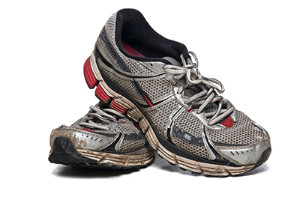
Runners know the importance of a good pair of shoes that help to clock in the miles comfortably and safely. But like any other piece of equipment, running shoes have a lifespan. If you are wondering whether it is time to bid farewell to your old shoes, here are some signs to look out for. First, pay attention to the wear and tear on the soles. If the treads are worn down, especially in specific areas, this can lead to reduced traction and increased risk of slipping or injury. Second, listen to your body. If you are experiencing unexplained pain in your feet, ankles, or knees, worn-out shoes could be the cause. They may no longer provide the necessary support and cushioning, which causes stress on your joints. Running shoes typically have a life span of 300 to 500 miles, depending on various factors. If you have surpassed this range, it is time to shop for a new pair. If you need guidance in the life span and safety of your running shoes, it is suggested that you make an appointment with a podiatrist for an evaluation.
All runners should take extra precaution when trying to avoid injury. If you have any concerns about your feet, contact Elliot T. Udell, DPM of New York. Our doctor will treat your foot and ankle needs.
How to Prevent Running Injuries
There are a lot of mistakes a runner can make prior to a workout that can induce injury. A lot of athletes tend to overstretch before running, instead of saving those workouts for a post-run routine. Deep lunges and hand-to-toe hamstring pulls should be performed after a workout instead of during a warmup. Another common mistake is jumping into an intense routine before your body is physically prepared for it. You should try to ease your way into long-distance running instead of forcing yourself to rush into it.
More Tips for Preventing Injury
- Incorporate Strength Training into Workouts - This will help improve the body’s overall athleticism
- Improve and Maintain Your Flexibility – Stretching everyday will help improve overall performance
- “Warm Up” Before Running and “Cool Down” Afterward – A warm up of 5-10 minutes helps get rid of lactic acid in the muscles and prevents delayed muscle soreness
- Cross-Training is Crucial
- Wear Proper Running Shoes
- Have a Formal Gait Analysis – Poor biomechanics can easily cause injury
If you have any questions, please feel free to contact our office located in Hicksville, NY . We offer the newest diagnostic and treatment technologies for all your foot care needs.
